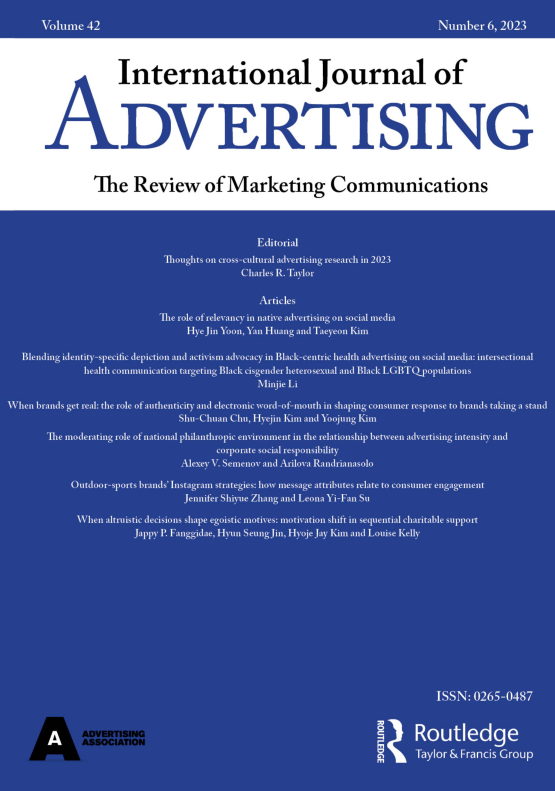Submit a Manuscript to the Journal
International Journal of Advertising
For a Special Issue on
Increasing the Effectiveness of Health Communication Advertising
Manuscript deadline
30 September 2024

Special Issue Editor(s)
Jeong-Yeob Han,
University of Georgia
[email protected]
Hye Jin Yoon,
University of Georgia
[email protected]
Increasing the Effectiveness of Health Communication Advertising
Health communication advertising is one of the most vibrant and multifaceted research areas in advertising and related disciplines. We now face numerous health challenges, including communicable and non-communicable diseases, substance use, mental health, healthy aging, suicide, health inequalities, and climate change, to name a few. An urgent question remains regarding the most effective content, structure, format, and placement of persuasive health advertising to improve all individuals’ and groups’ quality of life and well-being. With the expansion of user-generated content and technological innovations, the nature of health communication advertising and its design, content, and impact has consistently challenged the boundaries of the field, creating more opportunities for conversation and collaboration across disciplines, including but not limited to communication, public health, and marketing. We define health communication advertising in the broader sense, including advertising on paid, earned, and owned media, that presents aspects of contemporary health issues through a range of health messaging strategies and media platforms to increase their effectiveness on health-related knowledge and attitudinal and behavioral changes.
This special issue aims to reflect on the rich variety of individual and public health issues using theoretically driven, methodologically rigorous approaches and disseminate research with insights and actionable recommendations on the effectiveness of health communication advertising. We are open to a broad range of theoretical and methodological approaches as well as varied levels of analysis, including individual, group, organizational, cross-cultural, and international levels.
Relevant topics include, but are not limited to:
- Examining health communication advertising on diverse contemporary health issues, such as diseases (communicable, non-communicable), vaccination/immunization (e.g., HPV, pneumonia, flu, etc.), health maintenance, diabetes/obesity, mental health, active aging, DTC/OTC, environmental issues impacting health, etc.
- Reexamining and revisiting staple health communication advertising appeals such as threat and framing and examining innovative and newer cognitive/emotional appeals such as humor
- Health communication advertising using one or more combinations of digital/non-digital and paid/owned/earned media
- Ethical concerns/regulations/policy implications of health communication advertising
- Current political/societal/economic/media climate leading to attitude and behavioral change in health attitude and behavior
- Native advertising in DTC/big pharma and its potential for consumer deception
- User-generated, company/government-generated, and NGO-generated health communication advertising
- Health communication in diverse media such as traditional/non-traditional, digital/non-digital, eHealth/mHealth, and more interactive media such as wearables, digital apps, VR, AR, chatbot, and AI
- Studies with and about cross-cultural populations, geographically focused populations, the general public, subsections of the population, patient/non-patient, medical professionals, government officials, and NGO employees
- Research utilizing qualitative/quantitative, theoretical/literature review, meta-analysis, and interdisciplinary approaches to health communication advertising
Looking to Publish your Research?
Find out how to publish your research open access with Taylor & Francis Group.
Choose open access